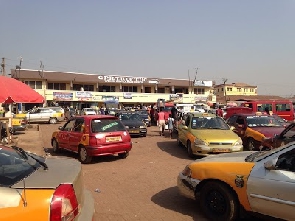A lorry station project constructed by the Sunyani West District Assembly at Chiraa in the Bono Region seems worthless, as commercial drivers in the area have resisted moving to the new location.
The drivers have failed to move to the lorry station after the first phase of the project, costing GHC199, 000.00 was completed four years ago.
However, the assembly is poised to commence works on the second phase which is expected to be completed by July.
According to the aggrieved drivers, the new station has no toilets and urinals, and limited space insisting until the Assembly provided male and female toilets and washrooms they would not use the station.
The drivers had for some years now allow passengers to board their vehicles on the shoulders of the Chiraa main road, a situation which is contributing to high pedestrian knockdown among school children.
In an interview with the Ghana News Agency (GNA) during a visit to the said town, the drivers said they were unhappy the Assembly failed to include toilets and urinals in the second phase of the project after they met and informed authorities to re-look at the contract.
The visit was in line with a STAR Ghana-funded project being implemented by the Sustainable Mission Aid (SMAid), an international non-governmental organisation (NGO), and the Ghana Journalists Association is aimed at monitoring specific development projects being constructed by the Assembly to ensure their completion.
To be completed in July this year, the 18 months project further aims at strengthening media and civil society organisation (CSO) collaboration for inclusive and accountable local governance in the country.
When contacted, Mr Dickson Ayi, the Sunyani West District Works Engineer confirmed the land for the lorry station was small but the Assembly had no other option because that was the land the Chiraa Traditional Council released for the project.
He told the GNA that the project did not include the sanitary facilities because the toilets and the urinals were not captured by in the budget for the project.
Mr Gilbert Asante, the Programmes and Resource Mobilisation Coordinator of SMAid, expressed disgust over the situation and called on District Assemblies to actively engage communities in decision-making processes.
He said the project had cost the government much, and it would be a huge financial loss to the state if the drivers failed to use the lorry station.
Mr Asante observed that local communities would have a sense of ownership if the assemblies regarded them as key partners in development if it engaged and interacted with them in identifying and addressing their priority needs.
Meanwhile, authorities at the Fiapre Model Girls Primary and Junior High School have commended the District Assembly for constructing a-six unit classroom block for the school.
Works on the block estimated at GH?320,000 is about 70 percent complete and being funded through the District Development Fund. It has offices, stores, staff common room, library and toilet and urinals for boys and girls, and teachers as well.
Mr Godwin Iwarahm, the Assistant Headmaster of the school said the school was fast growing and it had a population of 198 adding that management had partitioned the classrooms because of inadequate classroom blocks.
He appealed for ICT center and computers to facilitate and improve on the study of ICT among the students and pupils.
General News of Sunday, 12 May 2019
Source: ghananewsagency.org

















